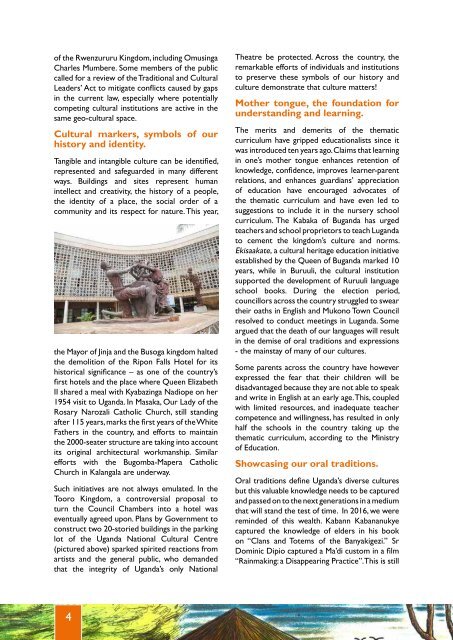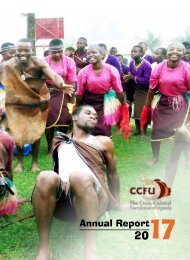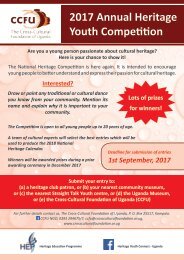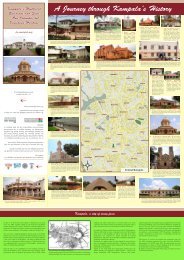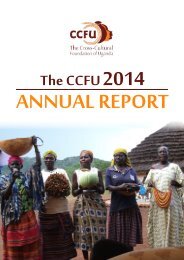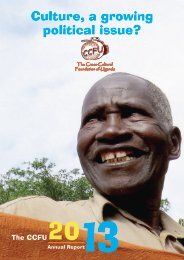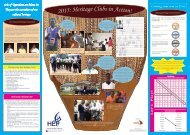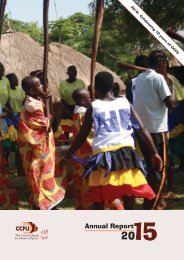CCFU Annual report 2016 Final
Does Culture Matter: Cultural affairs captured more media attention in 2016 than ever before. Does this reflect a growing acknowledgment by Ugandans that “culture matters”? A media review indicates a variety of developments in the culture sector in 2016.
Does Culture Matter: Cultural affairs captured more media attention in 2016 than ever before. Does this reflect a growing acknowledgment by Ugandans that “culture matters”? A media review indicates a variety of developments in the culture sector in 2016.
Create successful ePaper yourself
Turn your PDF publications into a flip-book with our unique Google optimized e-Paper software.
of the Rwenzururu Kingdom, including Omusinga<br />
Charles Mumbere. Some members of the public<br />
called for a review of the Traditional and Cultural<br />
Leaders’ Act to mitigate conflicts caused by gaps<br />
in the current law, especially where potentially<br />
competing cultural institutions are active in the<br />
same geo-cultural space.<br />
Cultural markers, symbols of our<br />
history and identity.<br />
Tangible and intangible culture can be identified,<br />
represented and safeguarded in many different<br />
ways. Buildings and sites represent human<br />
intellect and creativity, the history of a people,<br />
the identity of a place, the social order of a<br />
community and its respect for nature. This year,<br />
the Mayor of Jinja and the Busoga kingdom halted<br />
the demolition of the Ripon Falls Hotel for its<br />
historical significance – as one of the country’s<br />
first hotels and the place where Queen Elizabeth<br />
II shared a meal with Kyabazinga Nadiope on her<br />
1954 visit to Uganda. In Masaka, Our Lady of the<br />
Rosary Narozali Catholic Church, still standing<br />
after 115 years, marks the first years of the White<br />
Fathers in the country, and efforts to maintain<br />
the 2000-seater structure are taking into account<br />
its original architectural workmanship. Similar<br />
efforts with the Bugomba-Mapera Catholic<br />
Church in Kalangala are underway.<br />
Such initiatives are not always emulated. In the<br />
Tooro Kingdom, a controversial proposal to<br />
turn the Council Chambers into a hotel was<br />
eventually agreed upon. Plans by Government to<br />
construct two 20-storied buildings in the parking<br />
lot of the Uganda National Cultural Centre<br />
(pictured above) sparked spirited reactions from<br />
artists and the general public, who demanded<br />
that the integrity of Uganda’s only National<br />
Theatre be protected. Across the country, the<br />
remarkable efforts of individuals and institutions<br />
to preserve these symbols of our history and<br />
culture demonstrate that culture matters!<br />
Mother tongue, the foundation for<br />
understanding and learning.<br />
The merits and demerits of the thematic<br />
curriculum have gripped educationalists since it<br />
was introduced ten years ago. Claims that learning<br />
in one’s mother tongue enhances retention of<br />
knowledge, confidence, improves learner-parent<br />
relations, and enhances guardians’ appreciation<br />
of education have encouraged advocates of<br />
the thematic curriculum and have even led to<br />
suggestions to include it in the nursery school<br />
curriculum. The Kabaka of Buganda has urged<br />
teachers and school proprietors to teach Luganda<br />
to cement the kingdom’s culture and norms.<br />
Ekisaakate, a cultural heritage education initiative<br />
established by the Queen of Buganda marked 10<br />
years, while in Buruuli, the cultural institution<br />
supported the development of Ruruuli language<br />
school books. During the election period,<br />
councillors across the country struggled to swear<br />
their oaths in English and Mukono Town Council<br />
resolved to conduct meetings in Luganda. Some<br />
argued that the death of our languages will result<br />
in the demise of oral traditions and expressions<br />
- the mainstay of many of our cultures.<br />
Some parents across the country have however<br />
expressed the fear that their children will be<br />
disadvantaged because they are not able to speak<br />
and write in English at an early age. This, coupled<br />
with limited resources, and inadequate teacher<br />
competence and willingness, has resulted in only<br />
half the schools in the country taking up the<br />
thematic curriculum, according to the Ministry<br />
of Education.<br />
Showcasing our oral traditions.<br />
Oral traditions define Uganda’s diverse cultures<br />
but this valuable knowledge needs to be captured<br />
and passed on to the next generations in a medium<br />
that will stand the test of time. In <strong>2016</strong>, we were<br />
reminded of this wealth. Kabann Kabananukye<br />
captured the knowledge of elders in his book<br />
on “Clans and Totems of the Banyakigezi.” Sr<br />
Dominic Dipio captured a Ma’di custom in a film<br />
“Rainmaking: a Disappearing Practice”. This is still<br />
4


